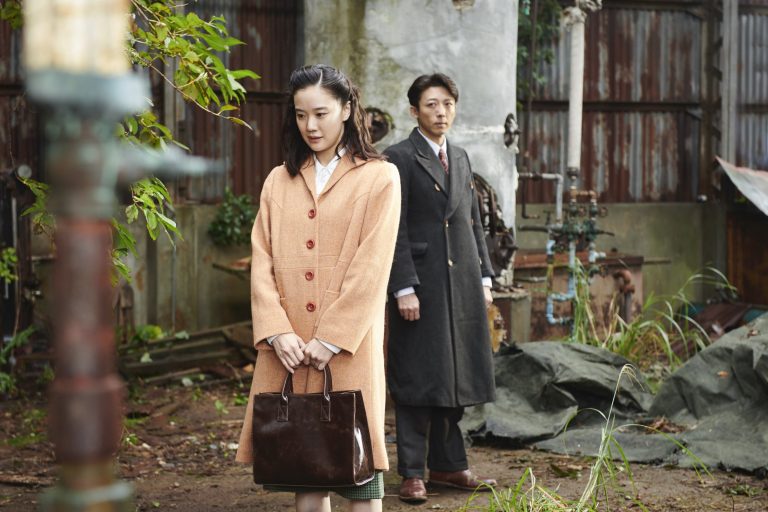
Master filmmaker Kiyoshi Kurosawa (Pulse, Cure, Tokyo Sonata) won the Silver Lion (Best Director) at the Venice Film Festival for this riveting, gorgeously crafted, old-school Hitchockian thriller shot in stunning 8K.
Synopsis : The year is 1940 in Kobe, on the eve of the outbreak of World War II. Local merchant and amateur filmmaker Yusaku (Issey Takahashi, Kill Bill) senses that things are headed in an unsettling direction. Following a trip to Manchuria, he becomes determined to bring to light the things he witnessed there, and secretly filmed. Meanwhile, his wife Satoko (Japan Society’s 2021 Honoree Yû Aoi) receives a visit from her childhood friend, now a military policeman. He warns her about Yusaku’s seditious ways and reveals that a woman her husband brought back from his trip has died. Satoko confronts Yusaku, but when she discovers his true intentions, she is torn between loyalty to her husband, the life they have built, and the country they call home.
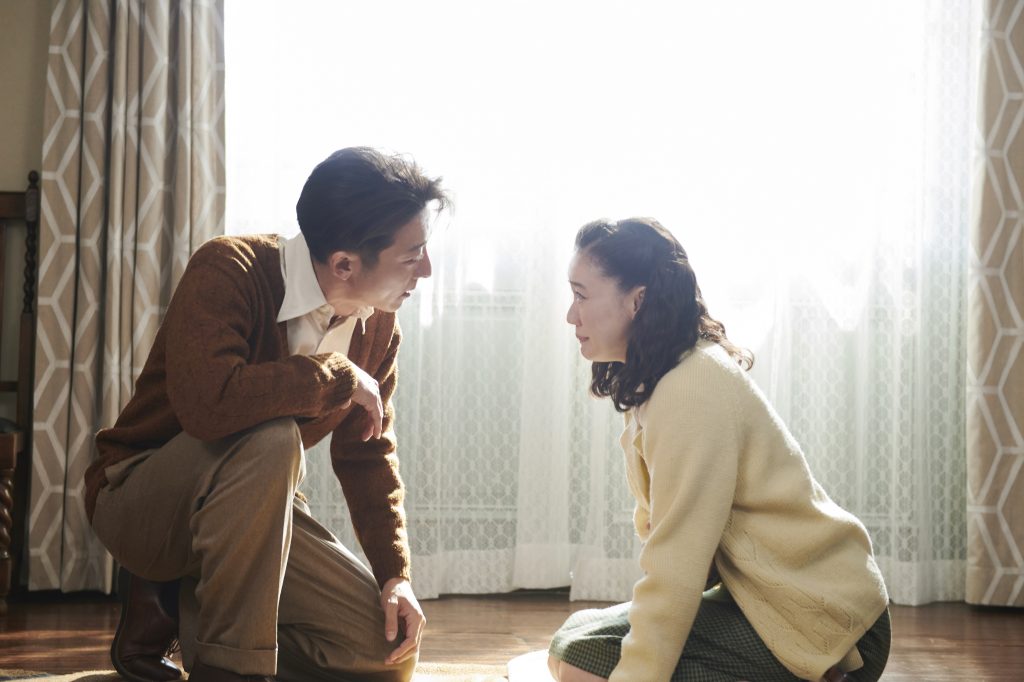
An Exclusive Interview with Director Kiyoshi Kurosawa
Q : Screenwriters Tadashi Nohara and Ryusuke Hamaguchi happened to be your students at Tokyo University of the Arts. How did you collaborate with them? Is it similar to Akira Kurosawa’s film, which screenwriters Akira Kurosawa and Shinobu Hashimoto wrote the script and Hideo Oguni would read and check the script?
K.K : There wasn’t a complicated exchange like Akira Kurosawa’s work, but Nohara and Hamaguchi came up with the original story, and it was a plot that was pretty close to the script. From the moment I read it, I thought it was interesting. I made some orders for budget, and shooting schedule, etc. But in the end they made the script. It was interesting, but it was quite long, so I revised it to suit the project due to budget constraints. I didn’t interact with them often. So basically, 80% was written by them.
Q : As similar case of the American Red Scare, depends on how did you associate with other people, it could change rest of your life. In this film, it’s very carefully crafted about the tightening of the Japanese government before the war. When you read the script of Mr. Nohara and Mr. Hamaguchi, was there anything that you added to the background of those times?
K.K : I don’t remember that much in detail, but I think the script written by Nohara and Hamaguchi was centered around the couple’s relationship. The part I added was a little more, the movement of the government and power symbolized by the military police played by Mr. Higashide, and the various pressures imposed on the couple. Probably, in Europe and the United States, people who fight against the government under such a war situation have been drawn in various forms of films or plays, but there are still surprisingly few in Japanese cinema. Those who were treated as poor victims or those who resisted the war itself were drawn in the 1960’s movies in Japan, but there were surprisingly few movies in which the general public resisted the government during the war. It’s a legitimate story for Westerners, but it may be quite a rare story in Japan.
Q : This film was shot in 8K through NHK, but I think that 8K would be effective in shooting sports, but are there any concerns about shooting this film in 8k?
K.K : I’m not an engineer, so I don’t know the details of how to complete 8K as a film, but in a sense, it was a contradictory project from the beginning. As you say, 8K is incredibly clear, and the details look like reality, so it’s suitable for sports broadcasts and art recordings. But when you shoot a fiction film with it, it’s already eye-catching. It’s so raw that it looks like it’s made up in front of you and it looks like an actor in a costume is acting, so how to make it naturally to the audience is a big challenge. Moreover, it is not modern, and it is set during the war, so at first there was a plan to take the plunge and make it a black and white film, or dare to change the image quality is extremely poor, but if we did that, there is no point in making it 8K. While retaining the high-quality images of 8K, we aimed to eliminate the vividness and establish it as fiction, which is a contradiction. But I think the result was really great. It’s like the painting that moves, it’s very vivid and clear, but it’s a screen that retains a certain kind of richness or fiction, and it takes months for engineers to finish.
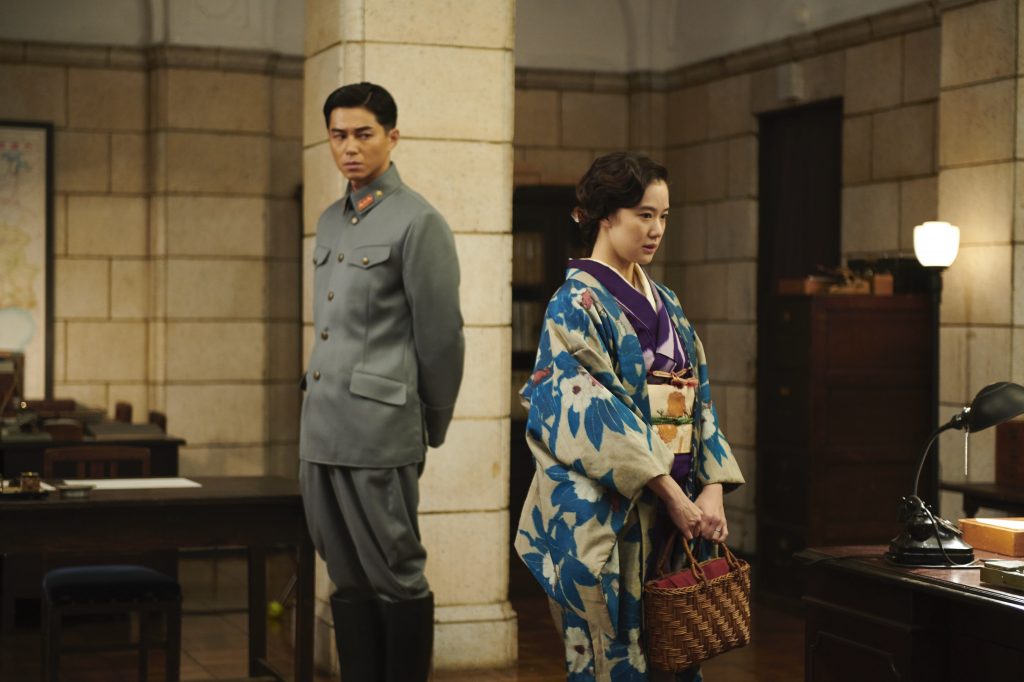
Q : Please tell us about the casting of Issei Takahashi, who plays Yusaku, and Yu Aoi, who plays Satoko. Did you do a careful rehearsal or read through the script in advance?
K.K : I have worked with You Aoi so many times, so I believed in her acting power 100%. However, Issei Takahashi was completely new to me, so at first I was watching over what would happen, but he was said to be the best of the 40 or so actors in the Japanese film industry. So I was relieved even before shooting. But my method doesn’t do any pre-rehearsals or read through the script. Anyway, I do a few tests at the set, but after a few tests, it’s my way to turn on the camera immediately. This time as well, I decided that it would be possible. Yu Aoi is doing really well in that way. In the first half of the movie, there was a scene in which Issei Takahashi’s character, Yusaku, talked about what kind of experience he had in Manchuria with long lines, but that scene was shot on the second day of shooting.
This was a very challenging schedule, but I thought it would be okay if that went well, and Issei Takahashi was prepared, and I supported only the general setup, and he played without rehearsals. I turned on the camera a couple of times, but it was over in no time. Mr. Takahashi and Mr. Aoi are the ones who are perfectly prepared before doing it.
In that sense, they are so professional.
They are the ones who have the perfect control over certain emotions and what they have to express, no matter how they come out, without having to adapt and test so many times. I finished shooting the scene on the second day without difficulty, so it was a lot easier from the third day. I think they also became confident that they got over the scene on the second day.
Q : Above all, I thought that the attraction of the script was Satoko. She was very intelligent, witty, and not a woman who didn’t know much about her husband and couldn’t handle it at all, but it was interesting to start acting on an equal footing with her husband or in anticipation of her.
K.K : That Satoko’s character was made by Nohara and Hamaguchi, not me, but when I first read the script, I thought that I wanted to make this film. When the film tackles a wartime, women are often depicted in Japan as just victims, poor people who send their husbands to the battlefield, unlike men. Of course there were such people, but at the same time, all the women were so passive, and if they were people who couldn’t do anything on their own, that wasn’t the case at all. However, it wasn’t treated as a drama. There are definitely a lot of such women, and they haven’t appeared in many stories, but they must have had various conflicts, so I was really happy to be involved in a movie that depicts such people. In the future, I think it would be great if Japanese films that deal with such times and have such entertainment characteristics could be made more and more.
Q : The band, Mr. Nagaoka from Tokyo Incidents(Tokyo-Jihen), is in charge of the music of this film. What kind of collaboration did you say?
K.K : The Tokyo Incident is a very famous band, but to be honest, I never thought that Mr. Nagaoka would do movie music. However, I heard that the producer knew Mr. Nagaoka and he had a desire to do movie music, so I met him for the first time because I was wondering if it was true. It may be a little arrogant to say, but I said to him, “It dares to be completely different from the music played in the Tokyo incident. I’ll leave it to you to decide what kind of song you want to make, but since it’s such an era and there is a genre of suspense and drama, I want you to make music that does not betray the taste of such a movie.” And I also said to him, “I don’t think there will be used for electric guitars.” Then he accepted, “I know.” He also had a background in classical music, so he made some kind of very orthodox standard film music, orchestration-oriented music using classical live instruments. It was very fresh, and I was very happy and surprised.
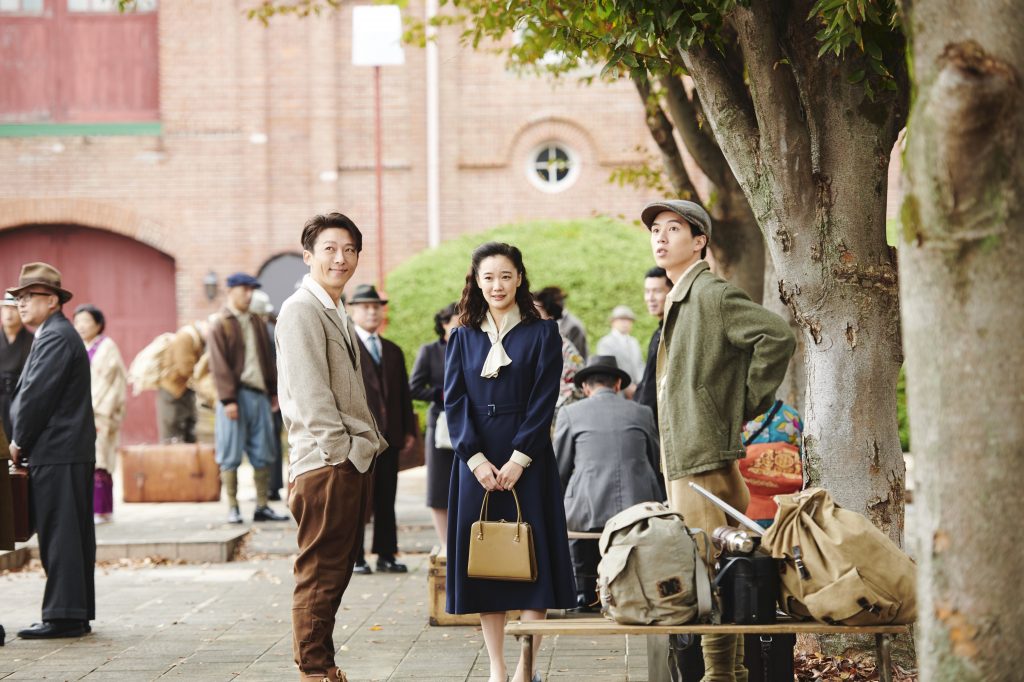
Q : When I watch your films, there aren’t many ensemble drama, you mainly draw a few characters and take a method that makes it easy for the audience to embrace emotions. Are you consciously making those types of the films?
K.K : I think that is a very sharp point. I don’t hate ensemble drama or avoid it, but I can’t quite put out a lot of characters in one movie. Somewhere, I think that this is the basis of the movie story, something like the old American B-class movies of the 1940s ~ 1950s that planted in my head. At that time, RKO’s movies were really about three or four main characters, but they were complicated, deep, and simple, but they made a series of movies that were extremely spectacular. I have a longing for something like that, so the number of characters doesn’t increase so much. So, rather than the story that spreads more and more, I just think about how to deepen it in some simple structures. I’ve loved such movies, so I feel like I can’t escape from those. I think there were some restrictions for those films, such as a low budget and not so many dates to shoot, but that’s why really simple and powerful movies were made at that time, and that kind of moviemaking is my dream.
Q : With some directors sticking to film and some directors shifting to digital, how do you want to shoot in the future?
K.K : People might be a little misunderstood, but I’ve been shooting digitally for a long time, and it’s almost difficult to shoot on film in Japan now, and using film costs a lot of money. So I had to use digital for about 10 years. However, it’s just that the tools have changed, and what we’re aiming for hasn’t changed at all. So far, no matter what tool you use, your goal is to be screened in a movie theater, where you’ll be aiming for a work that impresses the audience with beautiful pictorial images, just same as using a film to make a movie.
Q : Several years ago, director Hirokazu Koreeda said that few Japanese films could compete at festivals abroad. How do you view the situation of Japanese films today?
K.K : Since there are various overseas film festivals, it is difficult to see them all at once with one sense of value, but I think that the current Japanese films are comparable to those overseas film festival. However, they are not major films. Sometimes it’s an independent film made by a student, it’s a really small film made by an unknown person, and of course it doesn’t cost much. It’s like a small student film festival in Japan, and while watching such films, about 1 out of 10, you could come across a fairly high quality film.
However, such talent has not been incorporated into making a really major film, film that not publicly available and commercially successful. Even if those talented directors take it in, I think the problem is that the moment those directors shoot a commercial movie, all the talents that were wonderful in independent production are erased. That’s why Ryosuke Hamaguchi is a rare example. Until a few years ago, he was a director who made great movies but nobody knew, but fortunately in the last few years he started making a few major movies and became known to people. However, until a few years ago, he was completely unknown. So there are still more people like that in Japan.
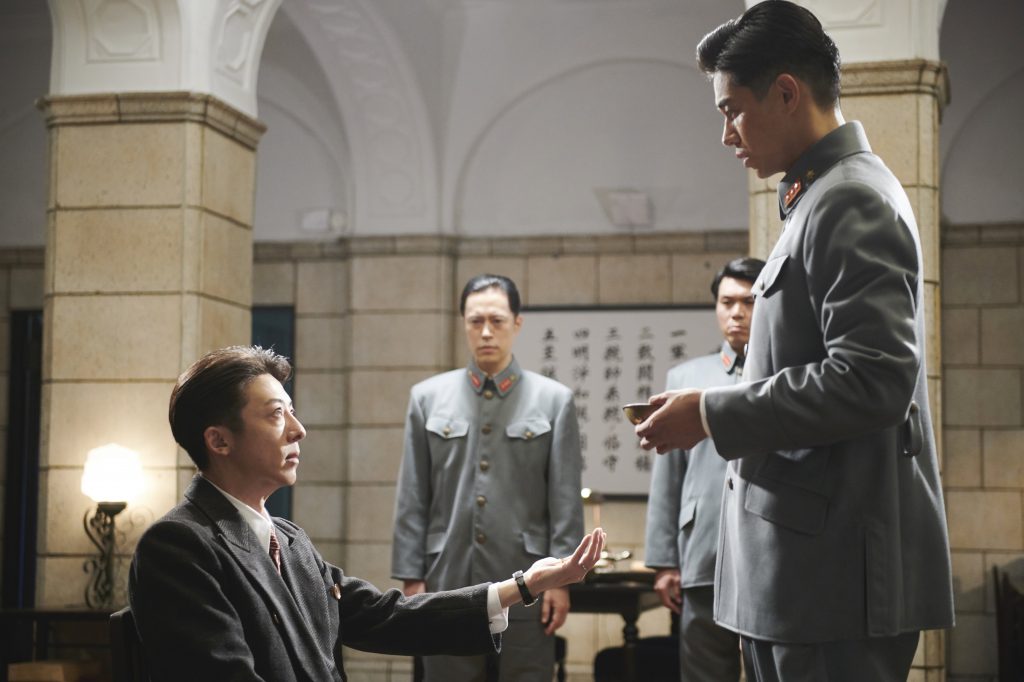
Q : In the United States, there is a company like A24, a movie company that supports such unique films, but are there any companies like that in Japan?
K.K : Well, the reality is that even if you want really talented young people to go to major films and play an active part, they also give up from the beginning that they do not intend to go to such major films, because of creative difference with producers or studios, they are desperately separating from those major films. They are claiming that, “In the system of major Japanese films, there is nothing I want to do, it is best to continue shooting my own work, or ideally leave Japan and shoot somewhere overseas.” The reality is that such young talent and major commercial films are completely divided in Japan.
Q : The other day, I saw the movie “It’s a Summer Film” at Japan Cuts, an event held at the Japan Society in New York. It’s an independent movie, but it also has a commercial element, and it was a movie presented a love for movies. I hope more movies like this will be made in Japan as well.
K.K : I think it’s great. I think that the Japanese film industry will change if dozens of such films are released every year instead of one in a few years.
Q : This is the first time you have tackled a period piece , but is there a genre that you would like to try in the future?
K.K : Well, I’m a person who wants to do anything, so I want to do anything I’ve never done before. But, this time, for the first time, I tried a non-modern era, and everything from the extras walking behind me was a fake, or I couldn’t make a proper film in the surrounding town. This type of filmmaking is really fresh to me. So there is a desire to make a period piece again. Well, it’s difficult to choose the subject for a period piece, but I think the one I want to try is a sword fight movie. Since sword fighting is a special genre, I don’t know if it’s a period thing, but it’s also a kind of costume play, so I’d like to try sword fighting. Even in the same war like this film, there is a desire to make a movie that is really set on the battlefield, set in another Manchuria or somewhere in mainland China.
Q : I would like to expect a large-scale movie like Akira Kurosawa.
K.K : It costs a little money, so we have to find out how far we can achieve it…lol
WIFE OF A SPY opens at
in NYC on 9/17 and at
in LA on 9/24.
Here’s the trailer of the film.

